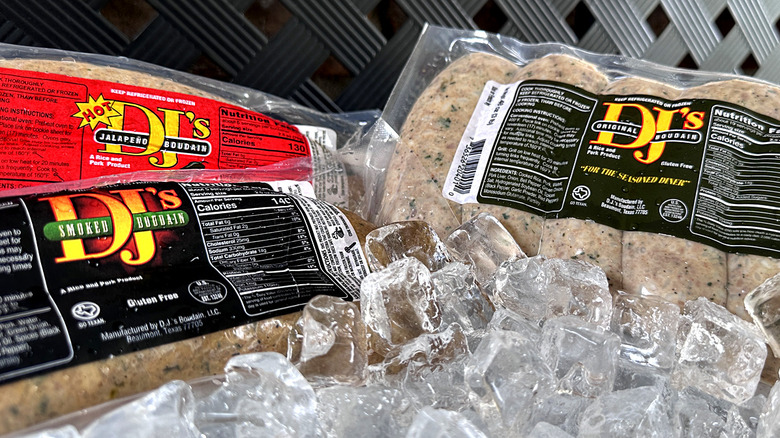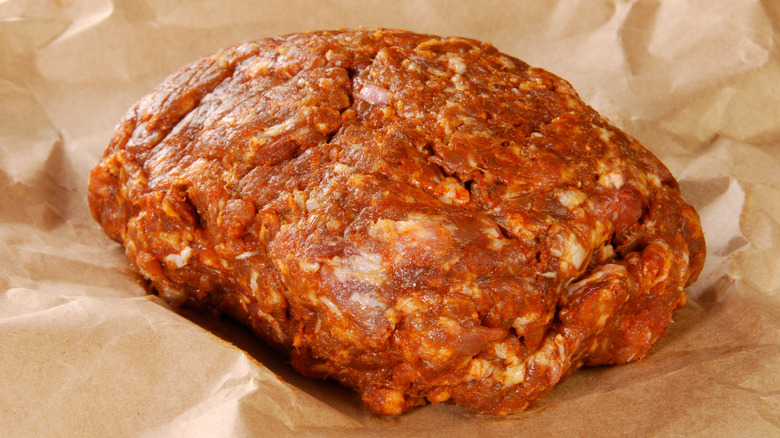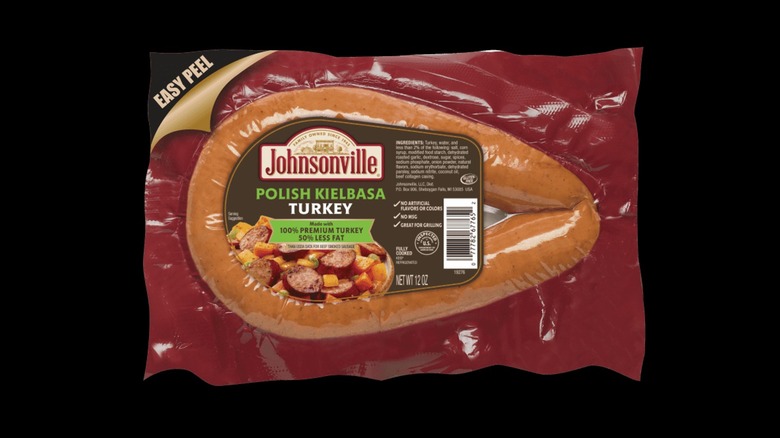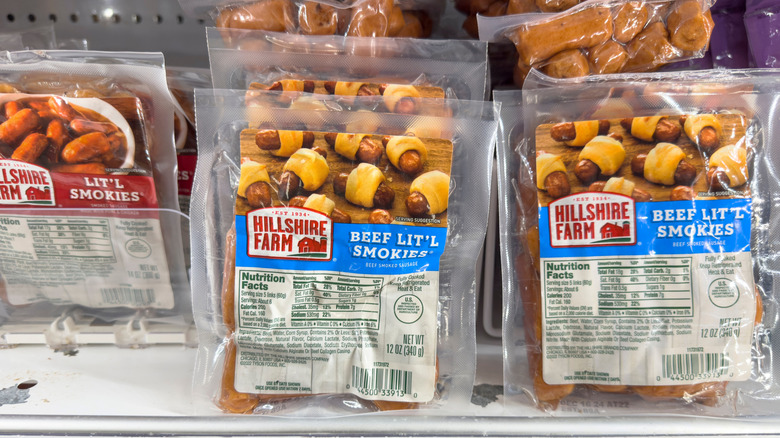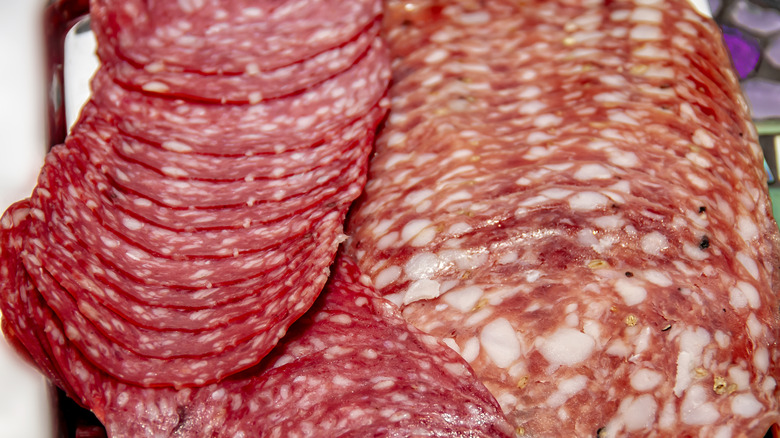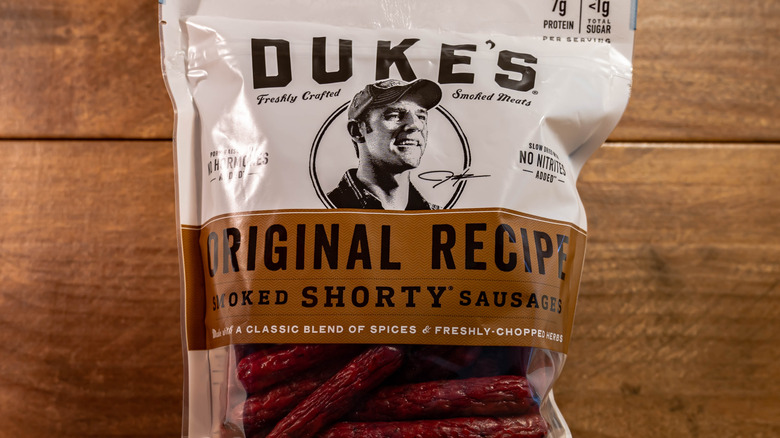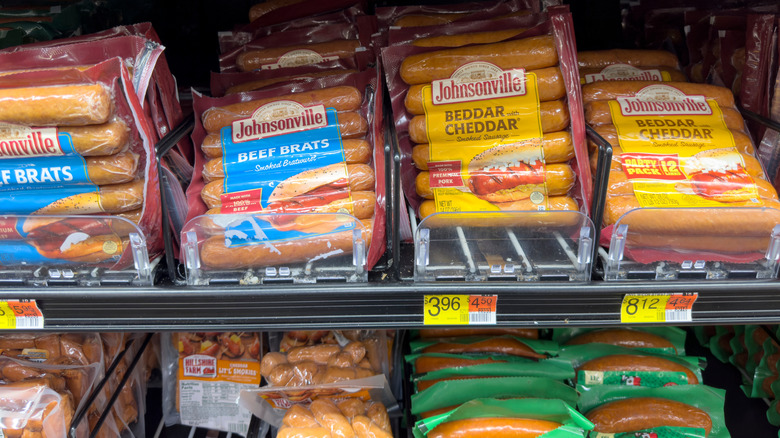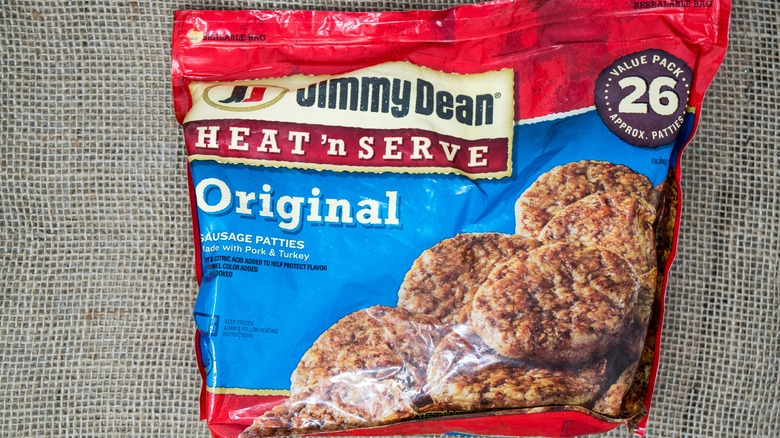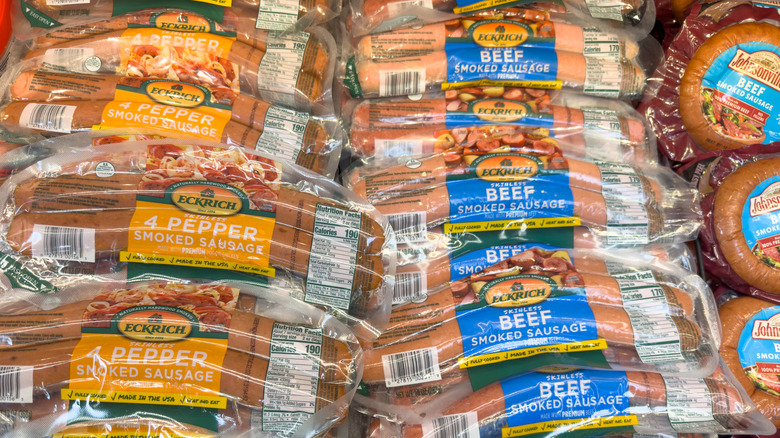Sausage Recalls That Affected Millions
Whether you prefer links or patties, the breakfast variety or those of the bratwurst persuasion, sausages have been a part of the human diet for centuries, tantalizing our taste buds with their savory, succulent, fatty, and sometimes spicy flavors. "Sausage" is a broad term, though, and you can find all sorts of sausages if you thoroughly peruse your grocery store. However, in general, we can all agree that a sausage should be made up of finely ground meat and seasonings, whether that meat is pork, beef, chicken, turkey, or something else.
Whatever your sausage of choice, though, there are some things you don't want to find in your link or patty — illness-causing bacteria, for one, or mysterious materials that somehow end up in the casing during the manufacturing process. Thankfully, when these undesirable inclusions are noticed, the brand or government will typically issue a recall, sometimes impacting a massive number of U.S. households. Here are some of the sausage recalls over the last few decades that have, in total, impacted millions.
Sausage recalled due to excess sodium nitrate (2025)
Sometimes, a food is recalled not because something innately bad found its way into it, but because it contains too much of something. This was the case in April 2025, when Smith Packing recalled nearly 20,000 pounds of products, including ready-to-eat sausage and bratwurst, because the deli products contained sodium nitrate in excess of the regulatory limit. The company only noticed the issue after consumers complained the items tasted odd and looked different.
The U.S. Food and Drug Administration (FDA) mandates that foods that use sodium nitrate as an additive not exceed levels greater than 500 parts per million. Sodium nitrate preserves, flavors, and colors packaged meats like sausage, and is fine to include in a balanced diet. However, you're not supposed to eat too much of it, as excessive consumption has been linked to a range of health issues, such as cancer.
Sausage links recalled due to foreign materials (2025)
In January 2025, the brand DJ's Original Boudain recalled 10 different types of sausage links, totaling nearly 18,000 pounds of product that had been shipped around Texas, Louisiana, and Mississippi. The recall came after one unlucky diner found a piece of a pen inside their sausage link. The brand reported that they'd also received one report of a consumer experiencing an oral injury from the bits of pen strewn throughout the sausage.
Foreign materials make their way into food on a pretty regular basis. As one of the most common reasons why food is recalled, these foreign materials can range from bits of plastic and metal from the manufacturing line to objects like rocks, sticks, or bugs that were picked up while a food was harvested. Wherever it comes from, eating it can cause discomfort and injury — which is why, when DJ's Original Boudain recalled its sausages, the FDA assigned its highest and most serious classification, Class 1. This means that eating the recalled product could likely cause serious health issues or even death.
Raw sausage recalled due to lack of inspection (2024)
In December 2024, Impero Foods & Meats in Baltimore recalled over 7,000 pounds of its Old World Italian Sausage, which had been sold in Maryland, Delaware, and Pennsylvania. The Food Safety and Inspection Service (FSIS) issued this recall, as it discovered that the company was producing the sausage in a facility that had not been properly inspected. As such, the FDA and FSIS gave the recall a Class I ranking. Unfortunately, tracking down all that sausage wasn't exactly easy, as it was sold wholesale and then distributed through other channels, at deli counters and in restaurants.
The FSIS requires that certain products and producers have an inspection grant, which assures that a facility has been properly examined and an inspector has confirmed the products are safe for human consumption. The inspection process for meat products includes inspecting the animals, equipment, personnel, and more.
Turkey kielbasa recalled due to rubber contamination (2024)
Also in 2024, Johnsonville recalled more than 35,000 pounds of its turkey kielbasa sausages after multiple consumers complained they had found pieces of rubber in the products. Luckily, no one reported that they had experienced any ill effects from eating the kielbasa (or the rubber).
You can eat a foreign object like rubber or a bit of plastic and it will travel through your digestive system and come out the other end. However, that's not the case for all potentially ingestible items, and that's not the case every single time, no matter what you've eaten. The item can lodge itself in your throat or get stuck in your digestive tract. At that point, you'd need to seek out health care to have the item removed — not exactly a fun process, which is why it's such a big deal when food ends up containing materials that are very much not-food.
Turkey kielbasa recalled due to bone matter (2024)
Johnsonville wasn't the only brand struggling with odd items ending up in its turkey kielbasa in 2024. The same year, Salm Partners recalled more than 133,000 pounds of its ready-to-eat turkey kielbasa, after the item was found to possibly contain small bone particles. Multiple consumers reported finding bones in the kielbasa, and one said they had experienced a minor oral injury.
Bone can make its way into sausage and meat products in general due to a variety of factors. For example, deboning equipment can leave small pieces of bone in a product. In some instances, during the actual animal processing, bone fragments can hide in the meat and be overlooked by processors; this is particularly an issue with sausage, as well as with other ground meats. If a little bone in your meat doesn't sound like a big deal, consider that a sharp piece can cut your mouth or esophagus, be a choking hazard, or even break your teeth.
Smoked sausage recalled due to bone fragments (2023)
Hillshire Farm likewise had to recall some of its products after bone fragments were discovered in 2023. The company recalled nearly 16,000 pounds of ready-to-eat meat and poultry-blend smoked sausages in September of that year, when consumer complaints were recorded, after unsuspecting shoppers discovered bone fragments in the product.
Hillshire managed to recover about 11,000 pounds of the recalled sausages that had been distributed across retailers in California, Maryland, New Mexico, New York, North Carolina, Pennsylvania, and Virginia. The other near-5,000 pounds of missing sausages may have simply been thrown away by consumers, or consumed without anyone reporting any issues. Due to the potential dangers that large pieces of bone could pose to consumers' health, the USDA allows for only a certain amount of small bone fragments to wind up in meat products, requiring bone fragments in pork products to be smaller than 0.02 by 0.03 inches.
Chicken sausage recalled due to multiple issues (2023)
In 2023, Alef Sausage recalled more than 60,000 pounds of ready-to-eat halal meat and poultry sausages and salamis due to a handful of issues. First, there was the misbranding — which basically means that the product's packaging doesn't contain information that is required for consumer safety. Often, misbranding comes into play when a product doesn't list a certain allergen. However, for Alef Sausage, the brand failed to indicate on its packaging that the products needed to be refrigerated.
That led to the second issue with the recall. Since the products weren't marked as requiring refrigeration, it was likely that "temperature abuse" occurred, or the products weren't kept at a safe temperature at various points throughout the product's lifecycle, not just when it went home with consumers. In fact, the only reason the FSIS found out about the issue was because someone reported seeing the unrefrigerated sausages sold in stores.
Meat snacks recalled due to product tampering (2019)
In 2019, Monogram Meat Snacks, which produces ready-to-eat sausages under the Duke's brand, recalled nearly 200,000 pounds of Duke's snack sausages. They were believed to have been tampered with, sometime following production but prior to distribution to retail stores nationwide. While the FSIS didn't explicitly state what the products were feared to contain, the recall did get the highest class ranking, meaning it was deemed pretty serious.
Food tampering is a malicious act, and the usage of this phrase means that someone possibly involved in the food production deliberately altered the sausages with the express intention of harming consumers. Tampering is generally split into three categories, and can include adding physical items, chemicals, or biological materials to food (such as bodily fluids). These alterations can occur both at the production stage and after the food has arrived in grocery stores, but before it's been purchased.
Smoked sausages recalled due to plastic contamination (2019)
Johnsonville has dealt with a variety of recalls over the years. In 2019, the brand recalled nearly 100,000 pounds of its ready-to-eat jalapeño cheddar smoked sausages after a consumer complained they found a piece of hard green plastic in one of the links.
Plastic is one of the most common foreign materials to wind up in food, and given its broad uses, that's not surprising — but some of the most common foreign materials found in food are a little more eyebrow-raising. In addition to the expected wood, stone, metal, insects, and bone, others can include glass, jewelry, insulation, bullets, needles, and the vague "personal effects." Of course, some of these foreign materials would only end up in your food if there was a case of food tampering (as it's not exactly easy for needles and bullets to wind up in the average food processing facility).
Breakfast sausage recalled due to metal contamination (2018)
In 2018, Jimmy Dean had to recall nearly 30,000 pounds of its Heat 'n Serve Original sausage links, after multiple consumers reported that they'd found metal strings in their sausages. At the time of the recall, the brand said the sausages had all come from a third-party manufacturer, CTI Foods, which also produces other meat products, soups, beans, and various sauces. The metal-contaminated sausages had been distributed to more than 20 states.
Jimmy Dean has been at the center of multiple recalls throughout the years. In 2012, the brand recalled some of its French toast and sausage breakfast sandwiches due to popular allergens — egg and soy — being present but not listed on the product packaging. That recall only impacted about 1,000 pounds of products, and can't hold a candle to a more recent breakfast sandwich recall; in April 2025, nearly 500,000 pounds of Hearthside Food Solutions breakfast sandwiches were recalled due to undeclared allergens.
Chicken sausage recalled due to misbranding (2017)
In what very well might be the largest sausage recall in recent history, in 2017, Century Packing Corp. recalled just under a million pounds of chicken sausage products that contained MSG, without stating so on the packaging. The affected products were sold under a handful of brands, including Great Value, but all were basically different takes on a chicken-based Vienna sausage.
MSG isn't a major allergen, so why does it matter if it's listed on the packaging or not? While it's not an allergen, some individuals have a heightened sensitivity to the compound and can experience adverse symptoms such as headaches, nausea, fatigue, and numbness upon consuming it. Fortunately, less than 1% of the population will experience this type of reaction and most people can eat MSG with no problem. For most, seeing any sort of reaction requires ingesting a very large amount of it.
Ready-to-eat sausage recalled due to a metal magnet (2017)
Yes, there are some food contaminants, like small pieces of plastic, that you could technically eat and be fine, as your body can pass them as it's designed to. However, one thing you definitely never want to eat? A magnet — and that's exactly what was discovered in the beef trim source product of nearly 140,000 pounds of ready-to-eat smoked meat and poultry sausage in 2017. The sausage, produced by Uncle John's Pride, was sold in varying flavors under the Garcia brand.
While eating magnets isn't typically something one has to worry about (unless it's hidden in your sausage), there are cases of individuals, particularly children, dying after consuming them. If two magnets are eaten, they can essentially fuse together within the intestinal tract, which can cause a hole to form in the intestine wall. At this point, the individual is at risk for blood poisoning and death.
German sausages recalled due to staphylococcal enterotoxin contamination (2017)
Typically, when you read about a recall related to bacteria, it usually involves salmonella, listeria, or E. coli. However, in 2017, German Sausage Haus recalled 1,252 pounds of meat products, including German smoked sausages, because there was a processing deviation that resulted in staphylococcal enterotoxin contamination.
If you're not familiar with this food poisoning culprit, staphylococcal enterotoxin is a bacteria-produced toxin that can be found in unrefrigerated meat, dairy, and bakery items. If you happen to eat this toxin, or even inhale it, you'll experience flu-like symptoms within the day. While most individuals can recoup from the illness on their own, in severe cases breathing assistance in the hospital may be necessary. A not-so-fun fact: The toxin has been weaponized by certain countries around the world. Luckily, it's destroyed when food is heated to at least 212 degrees F for several minutes.
Sausage links recalled due to mislabeling (2017)
Also in 2017, Pork King Sausage recalled 44,000-plus pounds of raw sausage links after it was discovered they did not declare a known allergen on their labels. The manufacturer failed to note that they contained milk, and the sausage had been shipped out to wholesalers and institutions across a good portion of the country, including Connecticut, Delaware, Florida, Georgia, Maryland, Massachusetts, New Jersey, New York, North Carolina, Pennsylvania, Rhode Island, South Carolina, and Virginia.
While only about 1 to 2% of children in the United States have a milk allergy (and most outgrow it), milk is still considered one of the major food allergens that have been identified as causing approximately 90% of all food allergic reactions. For those with a milk allergy, accidentally eating an item that contains it can result in symptoms such as gastrointestinal distress, hives, wheezing, and facial and throat swelling.
Armour Eckrish sausage recalled due to metal contamination (2017)
Armour Eckrich Meats recalled 90,978 pounds of smoked cheddar breakfast sausage, or about 8,800 cases of the stuff, due to the discovery of pieces of metal in the meat. The sausage had been distributed throughout Arkansas, Indiana, Kansas, Louisiana, Oklahoma, and Texas. However, the product had not made its way to retail customers, and it was only intended for food service customers. The company also noted that the issue was due to an isolated incident, and there was no cause for further concern.
While you might know Armour Eckrich best for its meats, the company has produced a variety of other items, and those have been at the center of recalls in the past as well. For example, the year before, in 2016, the company recalled its Armour Snackmakers Keebler Animal Crackers nationwide, as they were found to contain peanut residue without any warning on the packaging.
Chicken and turkey sausage recall due to hog and sheep casings (2015)
In 2015, Benedetti Farms recalled 11,670 pounds of chicken and turkey sausage, as they used hog and sheep casings, without declaring so on the packaging. You might think that it's a given that some sausages would be manufactured using natural casings like these, but that's not always true. Many sausages are sold with no casing at all, and synthetic casings exist made from cellulose or plastic (you can't eat the synthetic casings though). As such, some individuals may assume that a sausage that doesn't declare it's made with natural casings, isn't.
This can be a problem with a small portion of the population that suffers from Alpha-gal syndrome. This food allergy is often caused by a tick bite and causes typical allergic reactions upon consuming any meat or meat byproducts made from mammals. Since chicken and turkey are safe to eat for those with this syndrome, they could have picked up the Benedetti Farms sausage assuming it was safe. Unfortunately, the hog and sheep casings would likely cause an allergic reaction several hours after consumption.


